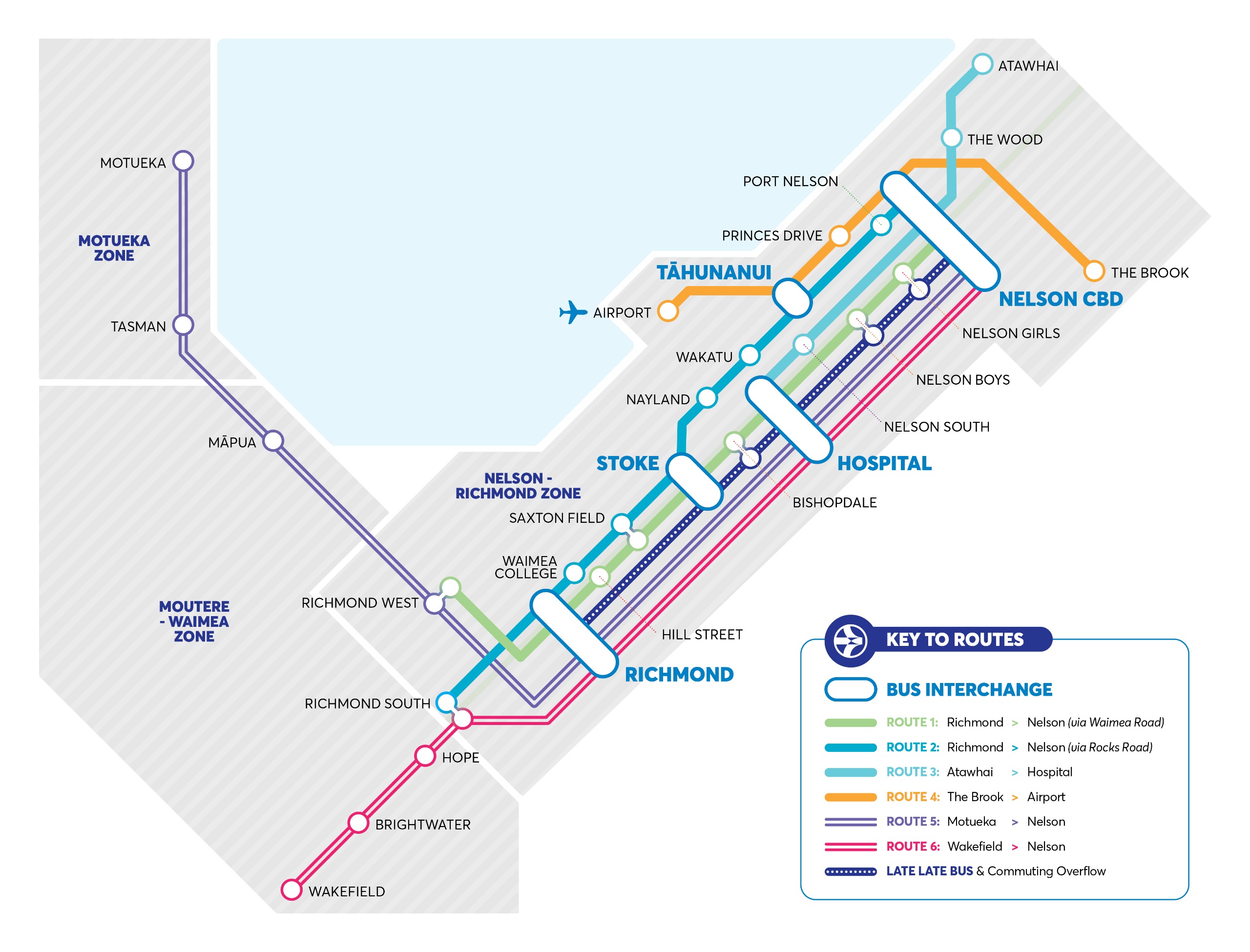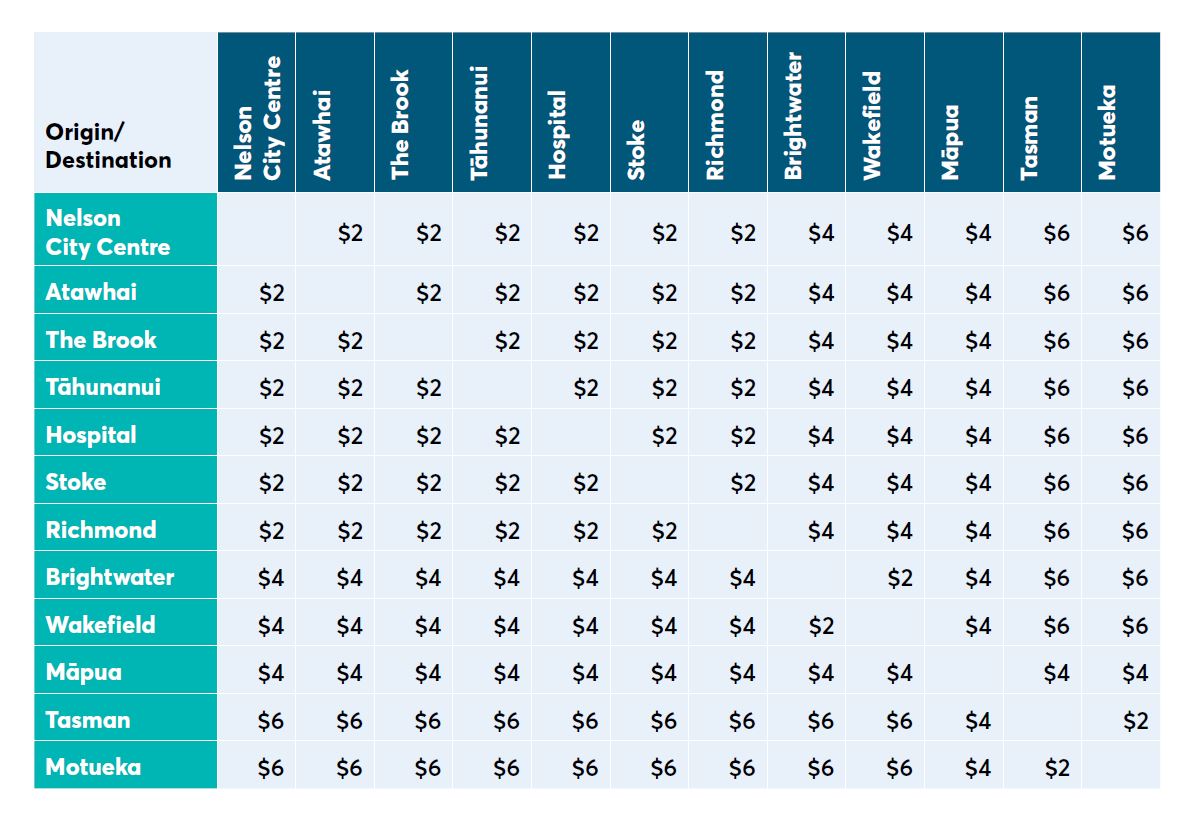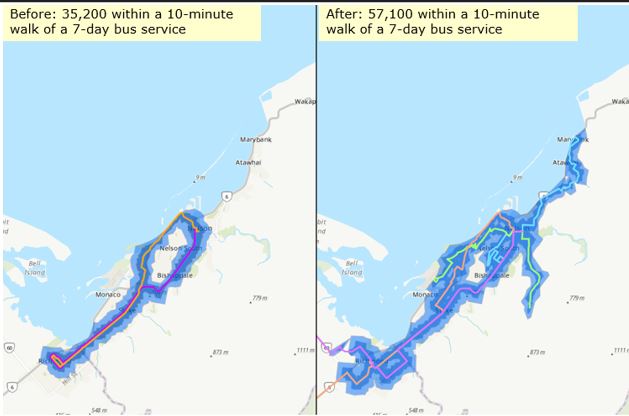Timetables & Detailed Route Map
-
 Full eBus timetable!PDF (221.78 KB)
Full eBus timetable!PDF (221.78 KB)Here's a timetable with every bus, at every stop, on every route. To fit it all in we have had to make the font size quite small. If this is an issue for you, please let us know in the Q and A in the right hand column of this page and we can help you out. Remember, on launch day there will be paper timetables with major stops listed plus live tracking and timetables at ebus.nz.
-
 Detailed eBus mapPDF (1.27 MB)
Detailed eBus mapPDF (1.27 MB)
Nelson Tasman's new bus service is a gamechanger for public transport in our region.
More buses, more often: a fleet of 17 electric buses will operate on a half-hourly timetable on all urban routes around Nelson and Richmond, 7am - 7pm, 7 days a week. That means there will be a bus from Nelson City Centre via Stoke to Richmond, or vice versa, every 15 minutes.
More destinations: new rural express routes servicing Motueka, Mapua, Wakefield and Brightwater. These buses run express from Richmond to Nelson City Centre (via the hospital) throughout the day including at peak times, so perfect for commuting to work.
Zero emission: electric buses are quiet and clean and will help Nelson-Tasman reduce greenhouse gases associated with transport.
Lower flat fare: we're introducing a low $2 flat fare (on Bee Card) for all buses in the urban area (that's journeys between Nelson and Richmond). That's without a concession applying, so if you have a Community Connect card, Gold Card or are a student the fare is even less.
Stoke On Demand: Stoke's hail and ride loop service is being replaced with an On Demand service. This allows passengers to order a bus to their nearest 'virtual' stop with an easy-to-use app or by making a phone call. The bus will reach the stop within 40 minutes - much less waiting around in bad weather!*
Note: Stoke On Demand service uses smaller low emission diesel buses rather than the larger electric buses.
Less changing bus: we have changed the way our routes work so people have to change buses less often. For instance, a journey from Atawhai to Nelson Hospital used to require changing bus at the Bridge Street interchange, but the new Route 3 will take passengers all the way to the hospital in one journey.
Airport bus: Route 4 now extends all the way from the Brook to the Airport, travelling via Nelson City Centre and Tāhunanui. Setting off every 30 minutes, 7am to 7pm, 7 days a week, Nelsonians and visitors will be able to get to the airport for a $2 fare (less for concessions).
Easier to use: improved real-time bus tracking, and e-readers at major interchanges will allow passengers to be more confident about when their bus is about to arrive.
Free wifi: all of our new buses come complete with access to free wifi, making them the perfect choice for commuters. Why not see if you can start your workday on your journey to work? Or if you prefer just relax with a TV show or your favourite podcast.
Simple bus route map

Lower fares!

Tasman Maps
Further information
One of the goals of our new bus network is to bring a regular bus service within a ten minute walk of as many residents as possible. The picture shows that the new network will almost double the number of people within a ten minute walk of a stop.
FAQs
The airport route is a part of Route 4 which goes from The Brook, through the Nelson city centre interchange into Tāhunanui and then to the airport. Monday to Friday, passengers looking to take the bus from the airport back to Wakefield, Brightwater, Motueka, Mapua and Hope can stay on Route 4 back to the Nelson city centre interchange where they can catch Route 5 which will go directly from Nelson to Motueka, or Route 6 from Nelson to Wakefield. Alternatively, passengers going to Stoke or Richmond can change from the Route 4 bus to the Route 2 bus at the TāhunanuiInterchange
The Late Late Bus is our current late night service on Friday and Saturday nights. We are assessing the role this service will have in the future and considering whether the time, and routes of this service will change in upcoming years. The August 1 upgrade concentrates on improving the frequency and coverage of the bus service as a first step, together with lower fares.
The increased frequency and additional routes require more buses than the current fleet of public transport buses.
There are currently two types of public transport buses in use in Nelson and Richmond. The first is a Mercedes Sprinter van (on Routes 3, 4, 5 and 6 as well as the Stoke and Richmond loops) and the other are larger buses on Routes 1 and 2. The new electric buses are 12.5m long, compared with the current larger buses which are 13.5m and the Sprinters, which will be used for the new Stoke On Demand service, are 7m.
To allow the new buses to travel down new routes we have to make adjustments.
There are some old raised tables along new routes where we need to modify the ramps. In addition, as the service has been extended to include new areas, some modifications have needed to be made (eg. Nelson Airport).
On Muritai Street close to Tāhunanui Drive at the existing bus stop locations. The Tāhunanui interchange will use two existing bus stops on Muritai Street. No parking will be removed to create this interchange.
Buses on routes 5 and 6 travel to Richmond before carrying on to Nelson, via the hospital. Instead of stopping at all the bus stops between Richmond and Nelson, they will only stop at the hospital interchange and the city centre hub interchange. In addition, routes 5 and 6 can take Wakatu Drive instead of Main Road Stoke. This means that passengers in Richmond will be able to take the faster express bus to Nelson centre or the Hospital and vice versa.
As long as you use a Bee Card, any journey taken on Routes 1-4, urban routes between Nelson and Richmond, will cost $2. Less if you have a concession. The latest central government budget also announced free fares for five-12 year olds and half price for under-25s, which are due to start later this year.
Yes, drivers will accept cash for your journey. However, users with a Bee Card pay a lower fare compared to those paying with cash. With a Bee Card you can have concessions loaded (eg. Gold Card), then tag on and off the bus for the zone you have traveled.
Passengers with Super Gold Concessions travel free with Bee card between 9am – 3pm. You will need to obtain a Bee Card with your Super Gold Card loaded, which you can do at Nelson and Tasman Council Customer Service Centres. Once this is done, you won’t be required to show your Super Gold Card when boarding.
We’re excited to expand our service into Tasman. Council is working through soon to be announced options for where passengers can easily access a Bee Card
Route 4 goes from The Brook, through the Nelson city centre interchange, into Tāhunanui and through to the airport.
There are four services from Motueka each day and four services going back. These are timed so people can use them to commute to work.
There are six services from Wakefield to Nelson each day, and six services going back in the opposite direction. These are timed so people can use them to commute for work.
Weekend services to Motueka and Wakefield will come in 2026.
A service to Wakefield will start on 1 August 1. Council will shortly be reviewing the Regional Public Transport Plan and can consider future changes. A route into the Motueka Valley may not have the population density to justify a new service but other community transport options may be appropriate.
The new eBus services do not include routes to the Glen or Hira. Council is investigating options for community services to these communities over the coming year.
Eighty percent of buses in the eBus fleet are electric, and the remainder are low-emission diesel. Low-emission diesel buses are used when buses need to be repaired or maintained, and also where a bus may need to spend the night away from the charging points in Richmond. This affects the Motueka bus service as the bus stays in Motueka overnight and cannot charge, The bus servicing the Stoke on Demand route will also be low emission diesel - this is predominantly because the batteries on Sprinter style buses are underneath the bus, which means they cannot kneel to allow passengers who use wheelchairs to board. As we continue to upgrade our network our aim is to have a fully electric fleet.
Bus services contractor SBL is creating a new bus depot in Richmond, which includes all the charging infrastructure. They have been working with Network Tasman to ensure the network has capacity. It is important to note that the batteries will not be empty at the end of each day and in some situations, a bus may just require a top up.
The fleet will be fitted with Lithium iron phosphate batteries, which offer a longer cycle life than other lithium-ion batteries. These are expected to have a lifecycle of up to 10 years. They come with an eight-year, or 640,000km warranty.
They will be repurposed as battery storage for a solar panel array on the bus depot in Richmond.
As with the current fleet, the new buses will be accessible for wheelchair users.
Absolutely! Each bus will be able to carry two (2) bicycles, as they can currently.
Small dogs are currently allowed on the Nbus service provided they are in a pet-suitable container, and this will not change with our new ebus service. Certified disability assist dogs are also able to accompany their owners on public transport.
Companion animals can potentially be registered as Certified Disability Assist Dogs, and there is information about how to do this at companionanimals.nz.
Our mid-term review of the current Regional Public Transport Plan will start in 2024 and this issue will be included in the review.
The annual operating costs for the new public transport services will be around $1.1M annually.
The new service is a joint initiative between Nelson City Council and Tasman District Council with funding from Central Government and Waka Kotahi.
Some of the old buses may be repurposed as school buses, others may be sold, this will be managed by SBL.
The OnDemand operates in Stoke from 9:00 am to 3:00 pm (outside of school hours). This doesn’t stop children from using it during the school holidays though.
The normal fare applies. Children Under 12 are free, and 13 – 18 are $0.50 with a Bee Card.
Nelson Tasman's first eBus arrives
More buses. more often
More buses, more destinations
All submissions (including your name and contact details) will be provided to Council workers for administration and analysing feedback, and to those who are involved in decision making on the consultation.
All submissions, including submitter names (unless you request otherwise) but not contact details, will be publicly available online. The body of your submission and any attachments will not be checked for personal information and it should be assumed that anything included in these will be made public.
Note, Council is subject to the Local Government Official Information and Meetings Act 1987 and a request for official information may cover your submission, including your address and other contact details.

















